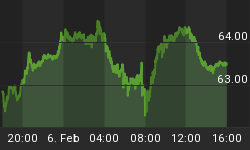What a week that was. Australia's conservative government gets thrashed by a bunch of unioncrats, lefty journalists and an economic illiterate with intellectual pretensions while at the same time as the US dollar goes high diving. These are certainly interesting times.
The falling dollar has got a number of people running around like headless chooks, as we say down here. What is generally overlooked is that the dollar has been declining for years. Anyone with a basic grasp of supply and demand analysis would know why. Regardless of what some commentators think the law of supply and demand applies to money just as it applies to all other economic goods.
I have occasionally pointed out that though the boom-bust cycle has a fundamental cause not every cycle share identical characteristics. It seems that it was only yesterday -- and maybe it was -- that bears were predicting an imminent recession. My opinion, however, was that the US economy still had steam in its boiler. To begin with, manufacturing is still expanding and investing, though at a somewhat slower rate, and productivity seems to be growing. Even if manufacturing was contracting it can still be a fairly long time before unemployment rises.
This was certainly the case with the Clinton recession where consumer spender actually increased. It now appears that current consumer spending is advancing at an increasing rate. (As Yogi Berra said: "It's like deja vu all over again"). In addition, I also figured that a depreciating dollar would stimulate the export of manufactures and that this in turn would help prolong the boom. And this certainly appears to be the case.
The textbook tells you that a depreciating currency has the effect of closing current account deficits. Although there certain conditions, it's pretty clear that the textbook is right for a change. (I have to admit that my 'latest' textbook is more than 30 years old). Exports are quickly shrinking the deficit and it has now dropped from a record 7 per cent of GDP to 5 per cent and still shrinking. The same monetary process is basically responsible for reducing the domestic deficit to about 1 per cent of GDP.
The sheer size of the US economy and the importance of the dollar ensures that the depreciation is likely to play havoc with European economies as their own exports to the US fall off and imports of US goods, including services, rise. This situation will be aggravated by China's dollar peg. Now this can only be maintained by China flooding the market with its own currency in an effort to prevent the yuan rising against the dollar, causing the prices of Chinese goods in terms of European currencies to fall even further. Naturally this state of affairs cannot continue indefinitely.
What we are witnessing is monetary disorder, a product of two dangerous monetary theories: the one theory has it that central banks should maintain a stable price level while the other theory maintains that interest rates should be used to control economic activity so that the economy is "not too hot or too cold". This is like trying to square the circle: something has to give and it has. The Fed knows that further cuts in rates could drive the dollar even lower. On the other hand, if it does not make more cuts the economy could come to a halt. My guess -- and it is only a guess -- is that Bernanke will go for further cuts. (Let us not forget that the spirit of Keynes is still abroad in the Fed).
All the doomsaying about the sub-prime mortgage crisis has, as I predicted, come to nought. It was argued that mortgage write offs would be at least $400 billion and this would come out at about 3 per cent of GDP. But as I have pointed out so many times before, GDP is not a genuine gross figure. Total spending is about $30 trillion which means that the write offs would amount to about 1.3 per cent of the true gross figure. As for the "mortgage crisis" hurting car sales by curbing bank lending, doomsayers are overlooking the fact that car companies have their own financing arrangements.
As usual the pessimists are looking in the wrong places. Although a recession is on its way it has still yet to arrive. When it does -- please blame monetary policy instead of the market.















